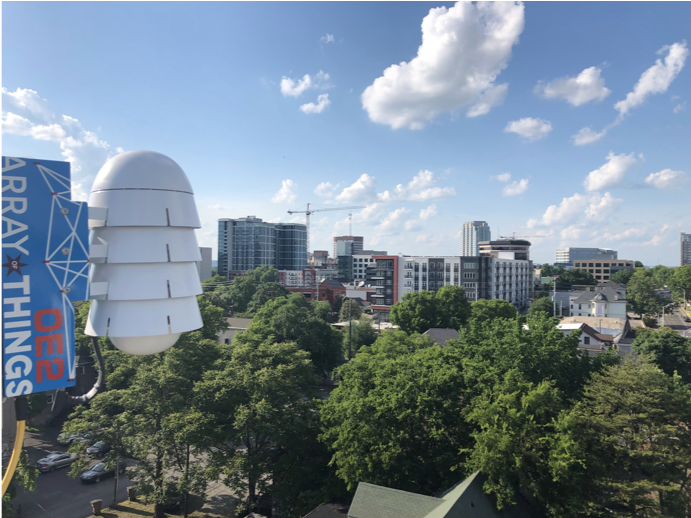

Leveraging Tennessee’s auto, electric vehicle manufacturing industries
The Transportation Network Growth Opportunity Proposal, a collaborative initiative consisting of Vanderbilt University, University of Tennessee, Knoxville, Tennessee Valley Authority and Oak Ridge National Laboratory, leverages the state’s competitive advantage in automotive and EV-related manufacturing and research to forge research and development partnerships, pilots and programs into a networked ecosystem that supports diverse, long-term innovation and economic development initiatives. The collaborative is seeking a significant investment over three to five years from Tennessee state government to potentially unlock an even greater investment in federal and private capital. This investment will propel Tennessee past its competitors to connect, compute, fuel and power the future of mobility.

Vanderbilt’s interdisciplinary experts work to improve mobility
Researchers with the Vanderbilt Center for Transportation and Operational Resiliency represent our core mobility research expertise at Vanderbilt; they are leaders in the transportation research community. VECTOR has been a hub for interdisciplinary research and educational activities involving freight and passenger transportation since it was established in 1988. The interdisciplinary team integrates transportation engineering, the social sciences, planning and risk analysis to assist in decision-making by the private and public sectors.
Major government sponsors of the mobility work at Vanderbilt include the Departments of Transportation, Housing and Urban Development, Defense, and Homeland Security; the National Science Foundation; and the Tennessee Departments of Transportation and Economic and Community Development.
AI-powered cruise control system may pave the way to fuel efficiency and traffic relief
With support from NSF, USDOT and the Department of Energy, the CIRCLES Consortium, consisting of Vanderbilt University and other university partners, in coordination with Nissan North America and TDOT, tested an AI-powered cruise control system designed to increase fuel savings and ease traffic using 100 specially equipped Nissan Rogue vehicles. The experiment was conducted on a sensor-filled portion of Interstate 24, where a single AI-equipped vehicle could influence the speed and driving behavior of up to 20 surrounding cars, potentially causing a positive ripple effect in day-to-day traffic. The collected data will be analyzed to assess the impact of the AI-equipped vehicles on traffic flow. The test was conducted on the I-24 MOTION testbed, the only real-world automotive testing environment of its kind in the world.
Mobility on campus and around Nashville
MoveVU is Vanderbilt’s strategic transportation and mobility plan, and the program provides options and resources for Vanderbilt faculty, staff and students to reduce their personal and collective carbon footprint.
MoveVU’s sustainable transportation efforts have been recognized by the state of Tennessee. In the past year, Vanderbilt has transitioned to deploy the first all-electric multi-vehicle shuttle fleet at a university in Tennessee. The transition to these EV shuttles will help Vanderbilt further reduce its direct emissions. In addition to being environmentally friendly, the new shuttles are quieter and smoother than traditional buses, providing a more comfortable ride for passengers. The electrification of the VandyRide fleet, as well as Vanderbilt’s MoveVU program, are supported by multiyear funding from the Congestion Mitigation and Air Quality Improvement Program, administered by the Federal Highway Administration and the Tennessee Department of Transportation.
A recent commuting survey also shows that compared to 2018, the percent of commuters driving alone to work decreased from 76 percent of all commuters to 52 percent. The percent of commuters reporting walking as their primary mode of transportation increased from 6 percent to 12 percent.
In the coming year, the Transportation and Mobility Office will create new MoveVU mode share goals to incorporate the commute survey results and the input received from Vanderbilt community members since the original mode share goals were established in 2019.
Vanderbilt engineering researchers are also working to improve pedestrian safety around Nashville:
- A researcher in the School of Engineering received a CMAQ grant to develop AI tools that could help prevent pedestrian-involved crashes.
- A professor of civil and environmental engineering, with support from Gresham Smith, is collecting heart and location information to determine pedestrian stress levels. Ultimately, the team is focused on identifying dangerous pedestrian locations and implementing risk-mitigating policies or infrastructure changes to improve safety.
Addressing transportation issues in Tennessee and beyond
Vanderbilt has an extensive portfolio of research supported by USDOT and TDOT’s State Planning and Research Program. All the projects are focused on transportation issues across the state to:
- Improve the effectiveness of Integrated Corridor Management systems like the multiphase I-24 Smart Corridor project.
- Understand crash data and use predictive models to help inform safety improvements on Tennessee highways.
- Facilitate the use of innovative information technologies in long-term planning, evaluating opportunities for cyberphysical systems to improve the efficiency, safety, security and sustainability of freight transportation.
- Promote intelligent mobility solutions and innovative approaches to transportation for Tennessee, including through the TennSMART consortium.
- Develop optimal charging and vehicle operation strategies for mixed fleet systems using machine learning models that estimate the energy usage for trips across different cities adjusting for traffic, weather and elevation patterns. Initial analysis points to savings of over $200K for small agency fleets in Nashville and Chattanooga.
Vanderbilt and UT Knoxville win NSF Sustainable Regional Systems Research Network grant
The School of Engineering and the University of Tennessee, Knoxville, received a grant from the NSF to create a research network aimed at improving electric, transportation and communication services in regions served by the Tennessee Valley Authority. The project includes collaboration between various stakeholders, including experts in engineering, social work, sociology, economics and computer science, as well as the Tennessee Valley Authority, Oak Ridge National Laboratory, and regional planning organizations. The project aims to make Tennessee’s infrastructure more resilient and sustainable while addressing disparities in service quality.
AI and community engagement utilized to redesign regional transit system
An assistant professor of computer science is leading a group of projects called Smart Transit with the Chattanooga Area Regional Transportation Authority, funded by a $2.1 million NSF grant and a $1.8 million DOE grant. The projects aim to reimagine regional transit systems using data science techniques. The NSF project will develop technology to design microtransit systems for areas where fixed-line transit is not economical. The DOE project seeks to combine fixed-route service with individualized transit for people with disabilities to create more energy-efficient solutions.
Resilient mobility
Our mobility systems need to be resilient against natural disasters; Vanderbilt researchers are working to understand the vulnerability of our mobility infrastructure:
- With support from HUD and ECD, researchers in the School of Engineering are designing, building and implementing a vulnerability assessment tool enabling stakeholders to perform spatial queries and analyses to estimate how vulnerable the infrastructure is.
- With support from DHS’ Cybersecurity and Infrastructure Security Agency, researchers in the School of Engineering are conducting an inland waterway resilience analysis of the Cumberland and Tennessee rivers with a focus on petroleum movements in the region. They are engaging stakeholders and characterizing the region with the goal of identifying resilience enhancement options.
- With support from TDOT, researchers in the School of Engineering are using machine learning to examine freight network vulnerabilities to disasters. The goal is to improve local/regional management of freight and supply chains by being able to plan for future disruptions.
Secure mobility
Our transportation systems are critical infrastructure; as they become increasingly interconnected, Vanderbilt researchers are working to ensure these cyber-physical systems are secure:
- A Vanderbilt computer science professor received a $6 million NSF grant to explore a new way to engineer CPS. The project aims to rethink how to model, analyze and design a new generation of intelligent transportation systems using the algorithms already running these systems. The researchers will collaborate with industry and academic partners to advance CPS both in research and education through training programs for high school and undergraduate students, with a particular focus on creating research opportunities for students from underrepresented backgrounds.
- Vanderbilt also received a $3.5 million ARPA-E grant to support School of Engineering researchers’ efforts to create software that can securely control the Smart Grid—a decentralized power system that is more efficient, sustainable and reliable than America’s current electrical power delivery.
For more information, please contact the Vanderbilt Office of Federal Relations:
Christina West 202-216-4370 | Heather Bloemhard 202-216-4368
federalrelations@vanderbilt.edu
FY 2023